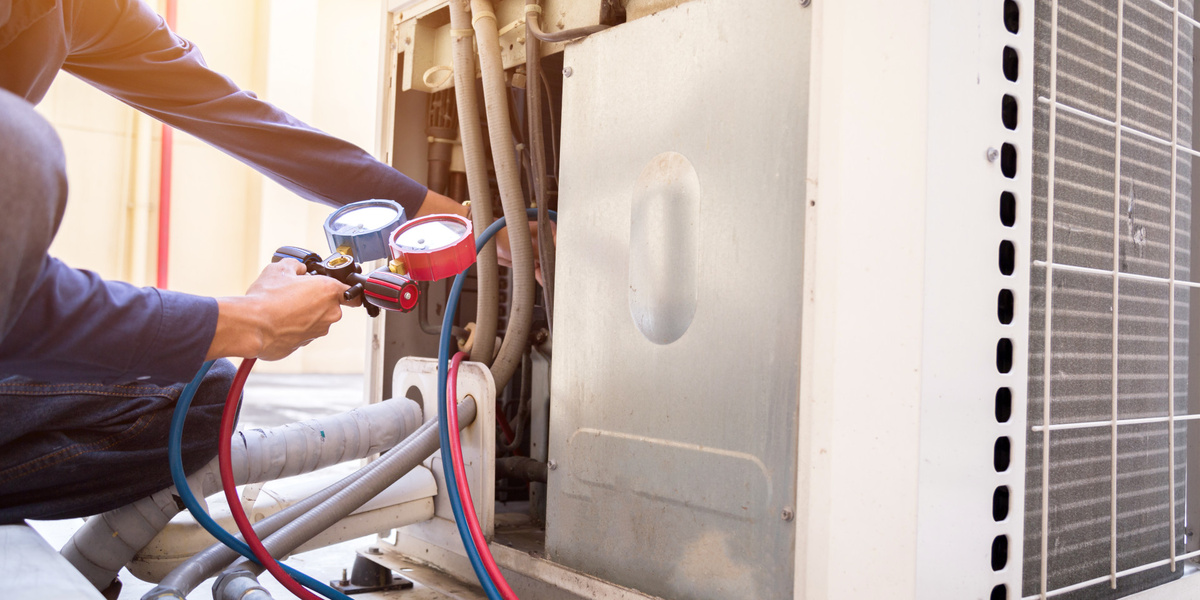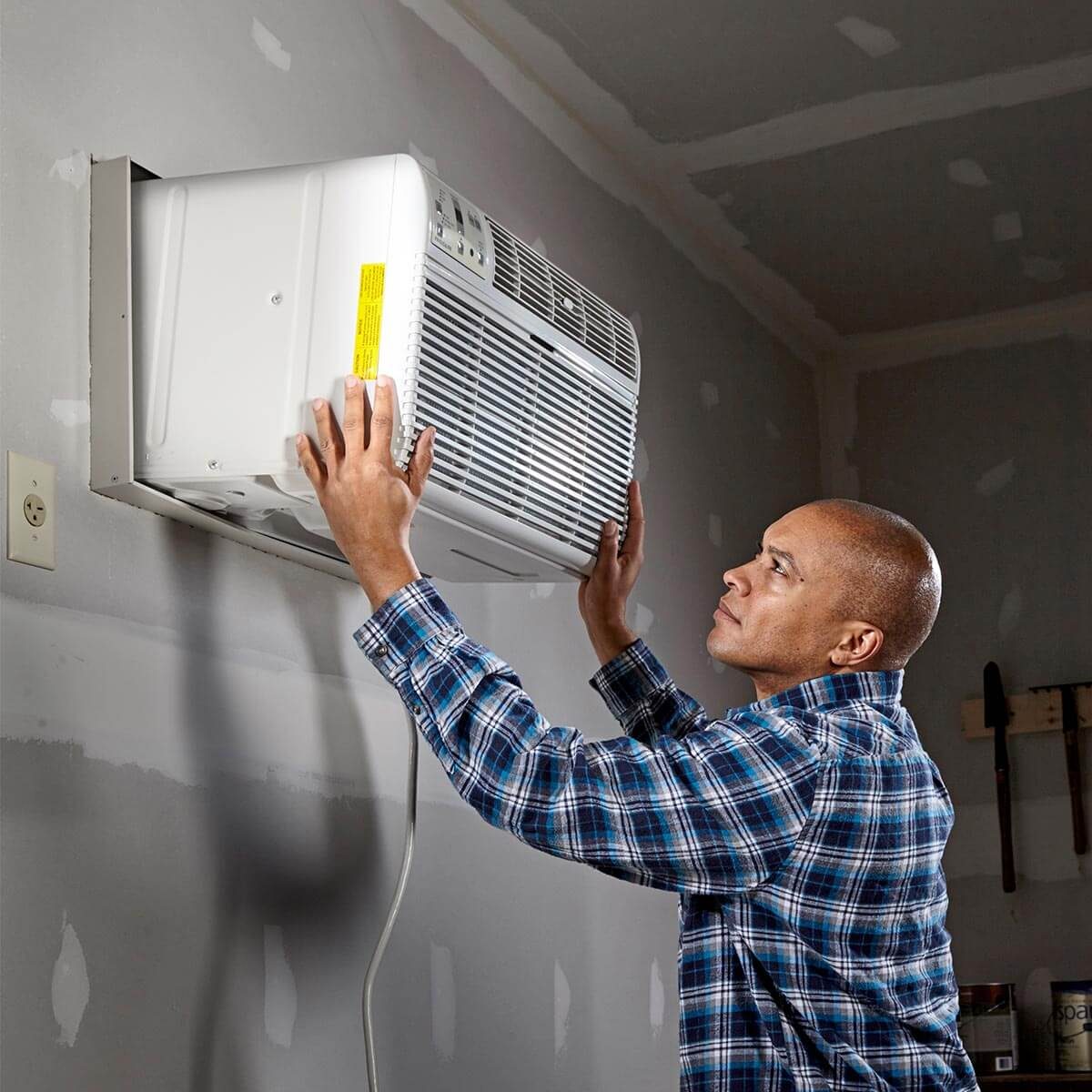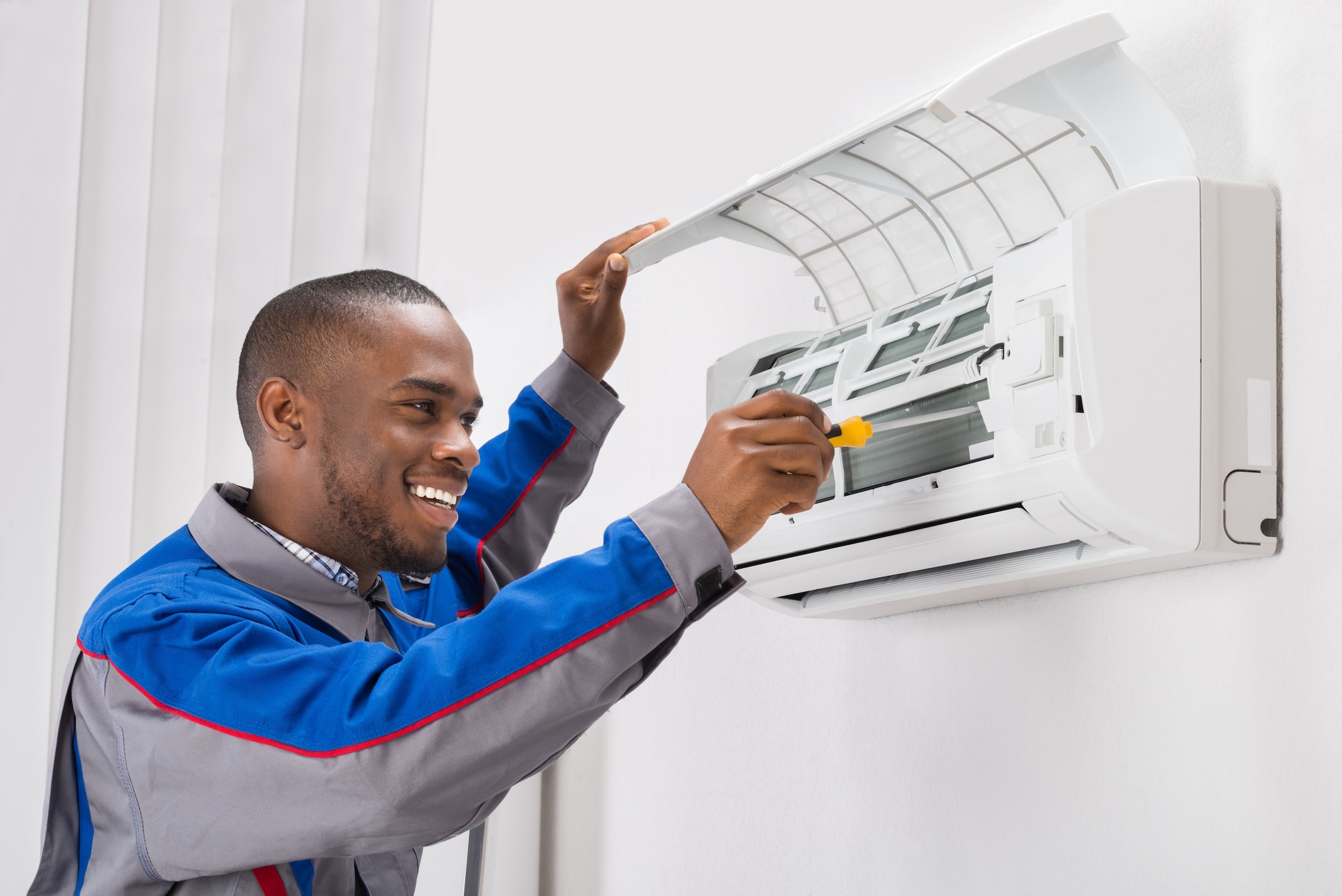Home>Home Maintenance>How To Get Air Conditioning License


Home Maintenance
How To Get Air Conditioning License
Modified: March 6, 2024
Learn the step-by-step process to obtain an air conditioning license for your home maintenance needs. Enhance your skills and ensure compliance with industry regulations.
(Many of the links in this article redirect to a specific reviewed product. Your purchase of these products through affiliate links helps to generate commission for Storables.com, at no extra cost. Learn more)
Introduction
Welcome to the world of air conditioning! If you’re passionate about keeping homes cool and comfortable, and you want to turn that passion into a career, then becoming a licensed air conditioning professional is the way to go. Whether you’re interested in installation, repair, or maintenance, obtaining an air conditioning license is a crucial step towards achieving your goals.
In this comprehensive guide, we’ll walk you through the requirements and steps to obtain your air conditioning license, allowing you to legally practice in the field. From the necessary education and training to the exams and fees involved, we’ll cover everything you need to know to start your journey towards becoming a licensed air conditioning expert.
Before we dive into the details, let’s highlight the importance of obtaining an air conditioning license. With the continuing rise in demand for cooling systems, it is essential to have skilled professionals who can ensure the correct installation, repair, and maintenance of air conditioning units. By becoming licensed, you not only gain credibility and trust from clients, but also open up opportunities for career advancement and higher earning potential.
So, if you’re ready to take the plunge into the world of air conditioning and embark on your licensing journey, let’s get started!
Key Takeaways:
- Becoming a licensed air conditioning professional requires meeting age, education, experience, and background check requirements. It’s crucial to research specific guidelines and understand the importance of obtaining a license for career advancement and client trust.
- Education, apprenticeships, written and practical exams, and licensing fees are essential steps in obtaining and maintaining an air conditioning license. Continuous learning, professionalism, and adherence to regulations are key to long-term success in the field.
Read more: How To Get Interior Design License
Requirements for an Air Conditioning License
Obtaining an air conditioning license requires meeting certain requirements set by regulatory authorities. These requirements can vary depending on your location, so it’s important to check with your local licensing board for specific guidelines. However, here are the general requirements you can expect when pursuing an air conditioning license:
- Age Requirement: Most licensing boards require applicants to be at least 18 years old. This ensures that individuals have reached the legal age to enter into contracts and assume the responsibilities associated with being a licensed professional.
- High School Diploma or Equivalent: In order to apply for an air conditioning license, you typically need to provide proof of having completed a high school education or having obtained a GED (General Educational Development) certificate. This requirement ensures a minimum level of academic knowledge and competency.
- Experience: Some licensing boards may have specific experience requirements that applicants must fulfill. This often involves working under the supervision of a licensed air conditioning professional for a certain number of years. Gaining practical experience not only enhances your skills but also helps you understand the intricacies of the industry.
- Criminal Background Check: Many licensing boards conduct background checks to ensure the safety and protection of consumers. Having a criminal record may not necessarily disqualify you from obtaining a license, but it’s important to be transparent about any past convictions or legal issues.
- Insurance: As a licensed air conditioning professional, you may be required to have liability insurance. This helps protect both you and your clients in case of any accidents or damages that may occur during the course of your work.
It’s important to note that these requirements may vary based on the type of air conditioning license you’re seeking, such as residential or commercial. It’s always recommended to thoroughly research the specific requirements for your desired license in your jurisdiction.
Now that you’re familiar with the general requirements, let’s explore the education and training required to obtain an air conditioning license.
Education and Training
Obtaining the necessary education and training is a vital step towards becoming a licensed air conditioning professional. It equips you with the knowledge and skills needed to excel in the industry. Here are the key aspects of education and training you should consider:
Technical Education
Many licensing boards require aspiring air conditioning professionals to complete a technical education program. These programs are typically offered by vocational schools, trade schools, or community colleges. The curriculum covers various aspects of air conditioning, including electrical systems, refrigeration principles, HVAC (Heating, Ventilation, and Air Conditioning) technologies, and more.
These programs combine classroom instruction with hands-on training to provide a well-rounded education. You’ll have the opportunity to learn about system design, installation techniques, troubleshooting methods, and safety protocols. It’s important to choose an accredited program that meets the requirements of your licensing board.
Continuing Education
After completing your technical education program, it’s essential to stay updated with the latest industry trends, technologies, and regulations. Many licensing boards require licensed professionals to participate in continuing education courses to keep their knowledge current. These courses can be completed online or through workshops and conferences.
Continuing education not only ensures that you maintain your license but also helps you expand your knowledge and expertise. You can choose courses that specialize in specific areas of air conditioning, such as energy efficiency, green technologies, or advanced HVAC systems.
Read more: How To Get A License For Landscaping
Certifications
In addition to your formal education, obtaining certifications can enhance your credibility as an air conditioning professional. There are various industry-recognized certifications available, such as those offered by organizations like the North American Technician Excellence (NATE). These certifications validate your competency and expertise in specific areas of air conditioning, such as installation, service, or refrigeration.
Obtaining certifications demonstrates your commitment to professionalism and continuous improvement. It can also open up doors to higher-paying job opportunities and increase your chances of success in the industry.
In the next section, we’ll discuss the importance of apprenticeships in your journey towards becoming a licensed air conditioning professional.
Apprenticeship
An apprenticeship is a crucial part of the training process for those seeking an air conditioning license. It allows aspiring professionals to gain hands-on experience under the guidance and supervision of experienced industry experts. Here’s what you need to know about apprenticeships:
Duration
The duration of an apprenticeship varies depending on the licensing board and the jurisdiction in which you are obtaining your license. Typically, apprenticeships last anywhere from two to five years. During this time, apprentices are exposed to real-world scenarios, honing their skills and gaining practical knowledge in the field.
On-the-Job Training
Apprenticeships involve working alongside licensed air conditioning professionals, assisting them with various tasks related to installation, repair, and maintenance. This hands-on experience helps apprentices develop technical skills, problem-solving abilities, and a deep understanding of the industry. They also learn about safety procedures, customer service, and effective communication while working with clients.
Supervision and Mentorship
Throughout the apprenticeship, apprentices receive guidance and mentorship from experienced professionals. These mentors provide valuable insights, share their expertise, and offer support and feedback as apprentices progress in their training. This mentorship relationship is invaluable in fast-tracking the learning process and building confidence in the trade.
Combining Classroom Learning with Practical Experience
Apprenticeships provide a balance between classroom learning and practical experience. While technical education programs teach the fundamental theories and principles, apprenticeships allow you to apply that knowledge in real-world situations. This combination of theory and practice is crucial in developing well-rounded air conditioning professionals.
Transitioning to Professional Licensure
Upon completion of your apprenticeship, you are ready to take the next step towards obtaining your professional air conditioning license. The practical experience gained during the apprenticeship will not only prepare you for the licensing exams but also provide you with a solid foundation for your future career as a licensed air conditioning professional.
In the next section, we’ll discuss the examinations required to obtain an air conditioning license.
Written Exam
Aspiring air conditioning professionals are typically required to pass a written examination as part of the licensing process. This exam evaluates your knowledge of air conditioning principles, regulations, safety protocols, and industry best practices. Here’s what you need to know about the written exam:
Read more: How To Get A Landscape Design License
Exam Content
The content of the written exam can vary depending on your jurisdiction and the specific licensing requirements. However, it typically covers the following areas:
- Refrigeration principles
- HVAC technologies
- Electrical systems and circuits
- System design and installation
- Service and maintenance procedures
- Energy efficiency and environmental regulations
- Safety protocols and procedures
It’s important to thoroughly study and understand these topics to prepare for the written exam. Reviewing textbooks, study guides, and online resources can help you familiarize yourself with the necessary knowledge and boost your chances of success.
Exam Format
The format of the written exam also varies, but it commonly consists of multiple-choice questions. These questions present you with several answer options, and you must choose the correct one. Some jurisdictions may include additional question types, such as true/false or fill-in-the-blank questions.
The exam is typically taken in a proctored setting, ensuring fairness and adherence to exam rules. The duration of the exam can vary, but it usually allows sufficient time for candidates to complete all the questions.
Preparation Tips
Preparing for the written exam requires dedication and thorough study. Here are some tips to help you prepare:
- Review the necessary textbooks and study materials recommended by your licensing board.
- Take practice exams to familiarize yourself with the format and assess your knowledge.
- Identify your areas of strengths and weaknesses and focus on areas where you need improvement.
- Join study groups or online forums where you can connect with other aspiring professionals and share study resources and tips.
- Create a study schedule and allocate dedicated time for exam preparation.
- Stay updated with industry news and regulations to ensure you have the most current information.
By adequately preparing for the written exam, you increase your chances of successfully obtaining your air conditioning license. However, passing the written exam is just one part of the licensure process. In the next section, we’ll discuss the practical exam that follows.
Practical Exam
In addition to the written exam, aspiring air conditioning professionals are often required to pass a practical examination as part of the licensing process. This exam assesses your ability to apply your knowledge and skills in real-world scenarios. Here’s what you need to know about the practical exam:
Read more: How To Get A Landscape Design License
Exam Content
The practical exam is designed to evaluate your hands-on skills and problem-solving abilities in the field of air conditioning. The specific tasks and scenarios assessed can vary depending on the licensing board and the type of license you are pursuing. However, common areas of assessment may include:
- System installation: You may be asked to demonstrate your ability to properly install air conditioning systems, ensuring all components are correctly connected and secured.
- Troubleshooting and repairs: The exam may require you to diagnose and fix common issues with air conditioning systems, such as refrigerant leaks, electrical malfunctions, or airflow problems.
- Maintenance procedures: You may be evaluated on your ability to perform routine maintenance tasks, such as cleaning coils, lubricating moving parts, and checking system performance.
It’s crucial to have a solid understanding of air conditioning systems and their components, as well as the ability to apply practical skills in a controlled setting.
Exam Format
The practical exam typically takes place in a designated testing facility or workshop, where you will be provided with the necessary tools and equipment. Licensed professionals or examiners will observe and evaluate your performance as you complete assigned tasks. The examiners will assess your technical competency, attention to detail, and adherence to safety protocols.
It’s essential to follow the instructions provided, demonstrate professionalism, and showcase your knowledge and practical skills throughout the duration of the exam.
Preparation Tips
Preparing for the practical exam requires a combination of theoretical knowledge, practical experience, and hands-on practice. Here are some tips to help you prepare:
- Review the practical skills and procedures required for the exam. Study the installation, troubleshooting, and maintenance techniques specific to the type of air conditioning systems covered in the exam.
- Practice the necessary skills in a supervised setting. If possible, work alongside experienced professionals to gain practical experience and refine your techniques.
- Use study guides and online resources to familiarize yourself with the common tasks and scenarios encountered in practical exams.
- Participate in mock exams or practice sessions to simulate the exam environment and build confidence in your abilities.
- Pay attention to safety protocols and demonstrate professionalism throughout the practical exam.
By adequately preparing for the practical exam, you increase your chances of successfully demonstrating your skills and securing your air conditioning license. Once you have successfully passed both the written and practical exams, you are one step closer to becoming a licensed air conditioning professional.
In the next section, we’ll discuss the fees associated with obtaining and maintaining your air conditioning license.
Licensing Fees
Obtaining an air conditioning license involves certain fees that vary depending on your jurisdiction and the type of license you are pursuing. These fees cover the administrative costs associated with processing your license application and maintaining your licensure. Here’s what you need to know about licensing fees:
Read more: How To Get A Home Inspection License
Application Fees
When you apply for an air conditioning license, you are typically required to pay an application fee. This fee covers the administrative expenses involved in reviewing and processing your application. The amount can vary depending on your location and the specific requirements of your licensing board.
Licensing Exam Fees
In addition to the application fee, there may be separate fees associated with taking the written and practical exams required for licensure. These fees cover the costs of organizing and administering the examinations. The exam fees can vary, so it’s important to be aware of the specific costs associated with your licensing board.
Licensure Fees
Once you have successfully passed the required exams, you will need to pay a licensure fee to receive your air conditioning license. This fee is typically paid annually or biennially and is necessary to maintain your licensure status.
Renewal Fees
To keep your air conditioning license active, you are required to renew it periodically. Renewal fees, similar to licensure fees, are paid at specific intervals and cover the administrative costs of maintaining your license. It’s important to renew your license on time to avoid any potential penalties or suspension of your licensure.
Read more: How To Get Plumbing Contractor License
Additional Fees
Depending on your jurisdiction, there may be additional fees associated with activities such as changing license details, requesting duplicate licenses, or obtaining endorsements for specific specialties or certifications. These fees are separate from the application, exam, and renewal fees and should be taken into consideration when budgeting for your licensing process.
It’s important to plan ahead and budget for these fees when pursuing your air conditioning license. Being aware of the associated costs ensures that you can complete the licensure process smoothly and avoid any financial surprises.
Now that we’ve covered the licensing fees, let’s move on to discussing the process of renewing and maintaining your air conditioning license in the next section.
Renewing and Maintaining Your License
Once you’ve obtained your air conditioning license, it’s important to understand the process of renewing and maintaining it. Renewing your license ensures that you can continue practicing legally and stay up-to-date with industry regulations. Here’s what you need to know about renewing and maintaining your air conditioning license:
Renewal Period
The renewal period for air conditioning licenses can vary depending on your jurisdiction. It’s essential to be aware of the specific timeframe within which you must renew your license to avoid any lapses in licensure. Renewal periods are typically annual or biennial (every two years).
Continuing Education Requirements
Many licensing boards require licensed air conditioning professionals to complete continuing education courses as part of the renewal process. These courses ensure that professionals stay updated with the latest industry developments, techniques, and regulations. The specific number of continuing education hours required can vary, so it’s important to check with your licensing board for their specific requirements.
Renewal Application and Fees
To renew your air conditioning license, you will need to submit a renewal application to your licensing board. The application typically includes providing updated information, documentation of completed continuing education hours, and payment of the renewal fee. Renewal fees cover the administrative costs associated with processing your renewal application and maintaining your licensure.
License Maintenance
In addition to renewing your license, it’s crucial to actively maintain your license during the renewal period. This includes complying with all professional and ethical standards set by your licensing board and staying current with any changes or updates to regulations within the air conditioning industry.
It’s important to note that failure to renew your license on time or to meet the continuing education requirements can result in penalties, fines, or even suspension of your licensure. Therefore, it’s crucial to stay organized, keep track of renewal deadlines, and fulfill the necessary obligations to maintain your license.
By actively engaging in continuing education, staying informed about industry best practices, and adhering to professional standards, you can not only maintain your licensure but also continuously enhance your skills and expertise as an air conditioning professional.
Now that you understand the process of renewing and maintaining your license, let’s wrap up our guide.
Conclusion
Congratulations on completing this comprehensive guide on obtaining and maintaining an air conditioning license. By now, you should have a clear understanding of the requirements, education, training, exams, fees, and renewal process involved in becoming a licensed air conditioning professional.
Obtaining an air conditioning license is a significant milestone that opens doors to a rewarding and fulfilling career in the field of home maintenance. It not only demonstrates your commitment to professionalism and expertise but also ensures the safety and satisfaction of your clients.
Remember, the journey towards becoming a licensed air conditioning professional requires dedication, hard work, and continuous learning. Take the time to research and understand the specific requirements set by your local licensing board, and seek out reputable educational programs and apprenticeships to gain the necessary knowledge and experience.
Stay up-to-date with the latest industry trends, regulations, and technologies through continuing education and certifications. Investing in your professional development will not only enhance your skills but also improve your chances of success and career advancement in the air conditioning industry.
Finally, don’t forget the importance of maintaining your license through timely renewal and adherence to professional standards. Keeping your skills current, engaging in lifelong learning, and prioritizing the safety and satisfaction of your clients will contribute to your long-term success in the field.
Now that you are equipped with the knowledge needed to embark on your journey towards becoming a licensed air conditioning professional, it’s time to take the first step. Embrace the opportunities, embrace the challenges, and embrace the joy of providing exceptional air conditioning services to create comfortable and livable spaces for individuals and families.
Good luck on your path towards becoming a licensed air conditioning professional, and may you soar to great heights in your career!
Frequently Asked Questions about How To Get Air Conditioning License
Was this page helpful?
At Storables.com, we guarantee accurate and reliable information. Our content, validated by Expert Board Contributors, is crafted following stringent Editorial Policies. We're committed to providing you with well-researched, expert-backed insights for all your informational needs.








